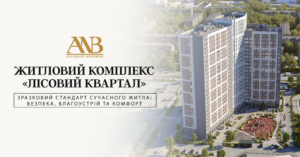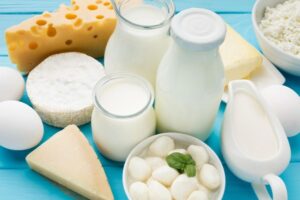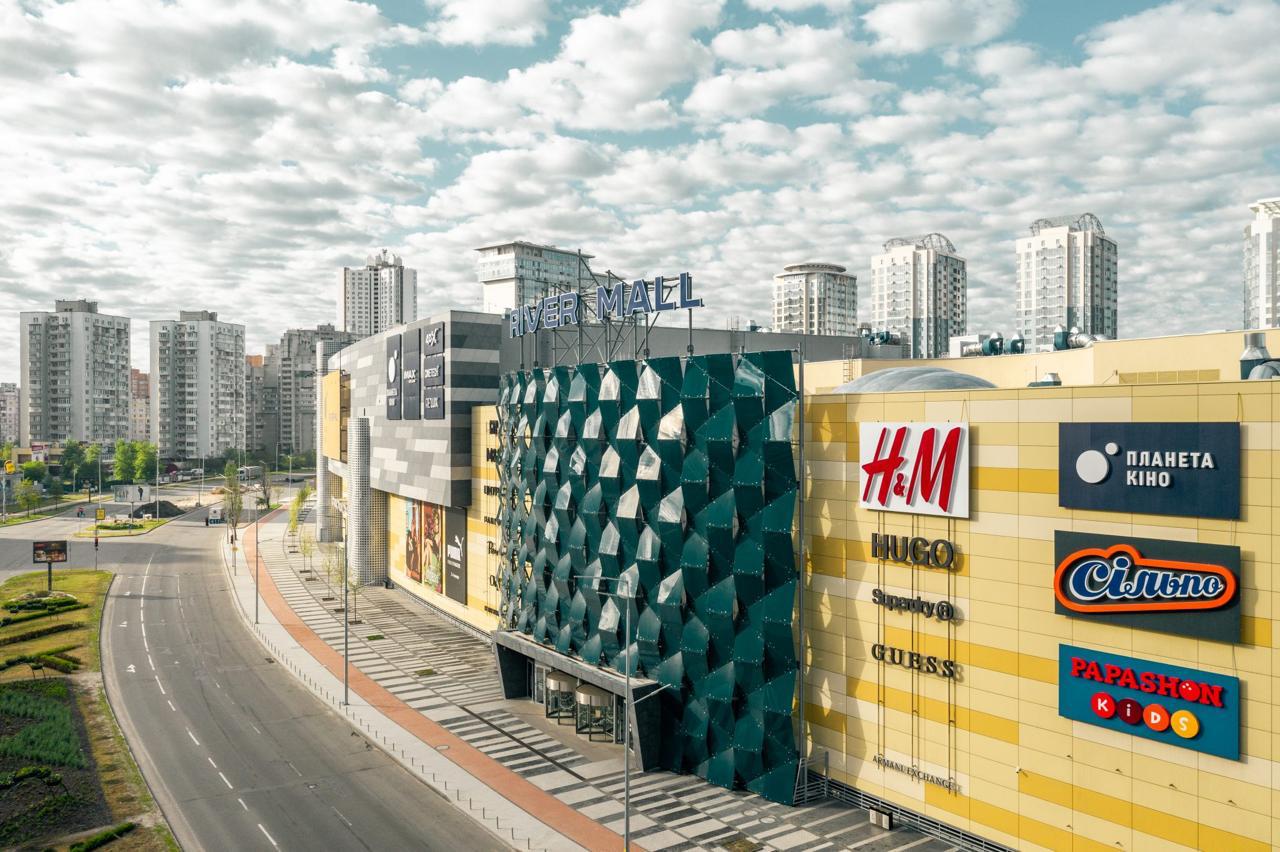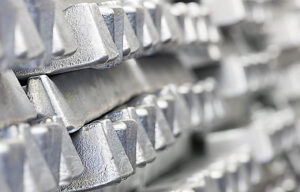
Lesniy Kvartal Residential Complex received an honorary award from the professional community – the Ukrainian Construction Olympus Award. The complex was recognized in the nomination “Exemplary standard of modern housing: safety, improvement and comfort”.
This award emphasizes the high level of architectural solutions, quality of construction and an integrated approach to creating a comfortable environment for residents.
In July, we started accepting applications for the purchase of apartments in the final building of the residential complex. This is the final stage of a large-scale project that has become one of the most popular in Brovary.
Iryna Mikhalova, CMO of Alliance Novobud, commented on the event: “This award is an important confirmation that we are moving in the right direction. “Lesniy Kvartal was created as a modern space for living – with well-thought-out layouts, its own infrastructure, landscaping and care for the safety of residents. The fact that the complex has been recognized by experts and, most importantly, the trust of buyers is of the greatest value to us. We are glad that the final house will be the final accent in the development of this successful project.”

In January-June 2025, Ukraine increased exports of dairy products by 51.4% to 327,000 tons compared to 216,000 tons in the same period of 2024,
while exports of milk-containing products increased by 35.8% to 410,000 tons compared to 302,000 tons, according to the Ukrainian Dairy Industry Association (SMU).
The industry association noted that the share of milk that was processed and exported from the country in the form of dairy products is growing.
According to analysts, the growth was most noticeable in January-June: the ratio of exports of dairy and milk-containing products (in milk equivalent) to the volume of milk sent for processing was 22.7%, with an increase to 25.9% in the second quarter compared to 19.3% in the first quarter.
This means that while in the first quarter approximately one-fifth of milk was used for the production of dairy products for export, by the end of the first half of the year this figure had risen to almost a quarter of the milk sent for processing, experts explained.
“Milk processing plants in Ukraine are increasing milk purchases, fully meeting the needs of the domestic market, and using all available opportunities to develop export markets,” the SMPA assured.

A new 3.5-hectare city park has been opened in the Darnytskyi district of Kyiv next to the River Mall shopping center on the Dnipro embankment. The project was implemented entirely at the expense of the investor, River Mall, according to the shopping center’s press service.
“We believe that the city needs not only infrastructure but also meaning. That is why River Mall invests not only in retail space but also in open public spaces,” added the shopping center’s administration.

The architectural concept was developed by Tetiana Speranska in collaboration with the shopping center’s architects. The park is designed as a space for leisure, events, and walks on the banks of the Dnipro River.
Immediately after its opening, the location became the venue for the first event — the Vytoky Ethnofest, organized jointly with the Zagoriy Foundation.
The event was part of the cultural project vytoky.com and included traditional rituals, performances by folk groups, craft workshops, and interactive activities for children. According to the organizers, thousands of residents of the capital attended the festival.

According to the shopping center, the next event — the autumn cycle of Ethnofest called “Harvest” — will take place in the park on August 23–24. The program includes performances by the Hryhoriy Veryovka National Academic Choir and the ShchukaRiba band, bread baking workshops, lectures, a fair of traditional Ukrainian bread makers, children’s areas, and more.
The River Mall shopping and entertainment center, with a total area of 140,000 square meters, opened in the capital in 2019.

Agroholding Agraine has begun sowing winter rapeseed in the Cherkasy, Kharkiv, and Zhytomyr regions, with over 1,000 hectares already sown, according to the agroholding’s press service on Facebook.
The agricultural holding specified that sowing in the 2025 season is early and began on August 2 thanks to favorable soil moisture conditions. No-till farming and direct sowing are used to preserve the soil.
“Early sowing will allow for friendly germination, and reducing the area will maintain soil fertility in the long term,” the company said with confidence.
At the same time, Agrain emphasized that compared to last year, the area under winter rapeseed has been reduced by almost 60% to optimize crop rotation.
“Reducing the area allows us to maintain proper crop rotation, preserve soil fertility, and return rapeseed to rotation at the optimal time,” the agricultural holding explained.
Agrain is engaged in the cultivation and storage of grain and oilseeds, as well as livestock farming. Before the full-scale Russian invasion, the agricultural holding company comprised 11 agricultural enterprises. It cultivated about 110,000 hectares in the Zhytomyr, Kharkiv, Chernihiv, Odesa, and Cherkasy regions.
The holding company is owned by SAS Investcompagnie (France).

In January-July 2025, Ukraine increased imports of aluminum and aluminum products by 20.1% to $300.252 million (in July – $45.832 million). Exports of aluminum and aluminum products during this period increased by 33.1% compared to the same period in 2024, to $85.707 million (in July – $14.839 million).
Aluminum is widely used as a structural material. The main advantages of aluminum are its lightness, malleability, corrosion resistance, high thermal conductivity, and non-toxicity of its compounds. In particular, these properties have made aluminum extremely popular in the manufacture of kitchen utensils, aluminum foil in the food industry, and for packaging. The first three properties have made aluminum the main raw material in the aviation and aerospace industries (recently, it has been replaced by composite materials, primarily carbon fiber). After construction and the production of packaging—aluminum cans and foil—the largest consumer of aluminum is the energy sector.

In 2024-2025, medium and large businesses in Ukraine will more often choose private clouds – due to the requirements for data control and compliance with security standards. The trend has intensified against the backdrop of war and regulatory requirements, notes Volodymyr Bjelov (GigaCloud) in a column for Interfax-Ukraine.
The key change is the transition from “formal incident plans” to built-in cybersecurity: PAM, SIEM, SOC, encryption, DDoS protection are now considered at the level of cloud solution architecture, rather than as an “add-on”.
GigaCloud is a Ukrainian cloud provider (part of GigaGroup), founded in 2016. The company provides IaaS/PaaS services, virtual data centers, redundancy and continuity solutions (DR/BCP) and GPU clouds. The infrastructure is hosted in data centers in Ukraine and the EU (Kiev, Lviv, Warsaw) with TIER III/IV compliance; the provider has VMware Cloud Service Provider (Premier) statuses and is registered in CSA STAR Registry, portfolio – over 1.5 thousand customers.
ARCHITECTURE, BUSINESS, GigaCloud, private clouds, SECURITY, Vladimir Bjelov